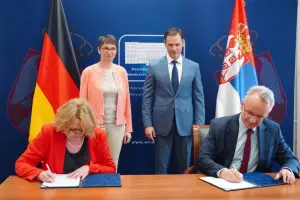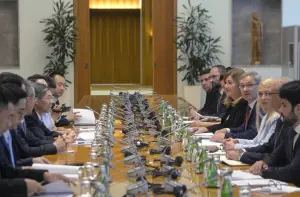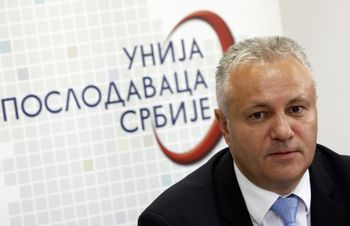- Serbia
Get to know Serbia
- Citizens
Culture and science
Health services
Pension and disability insurance
- Business
Employment
Economy
- Media
- Government
- Contact
Keep in touch
Contact form
Back
Keepin touch
Whether you have a question, comment, suggestion or any problem in the purview of the government, send us your message and we will try to respond as soon as possible. If your problem is not in our purview, we will forward your message to the relevant institution.
Q:
A:
Directing gray economy into legal channels
Belgrade,
11 September 2012
Minister of Finance and Economy Mladjan Dinkic announced today that the companies that are in illegal flows that have so far been controlled by the market inspection employing only a few hundred people will now be controlled by approximately 7,000 people from the Tax Administration and tax police.
After a meeting at the Serbian Association of Employers, Dinkic told reporters that the government will empower the Tax Administration and tax police to control unregistered businesses, and thus help introduce order on the gray market.
He announced that entrepreneurs will not be controlled by year’s end and they will have time to register until then and to pay a flat tax of 10%.
According to him, in case they do not do so by 1 January 2013, they will pay tax at a rate of 20% and their goods will be confiscated, first temporarily for 45 days, and if they do not register, the goods will be kept permanently.
The Minister said that the country's gross domestic product could be 20% higher after directing the economy into legal channels.
He recalled that as of 1September artisans no longer have to issue fiscal receipts.
Dinkic announced that the Tax Administration will notify approximately 40,000 artisans who no longer have to keep cash registers.
He also announced reduced bureaucracy in the Tax Administration, so as of 1 July 2014 tax applications will be in electronic form, and starting from 2013 the taxes and contributions will not be paid into seven different accounts, but into one.
Dinkic said the government was forced to raise the general VAT rate from 18% to 20% because it needed to save €1 billion in one year.
It was impossible to find the money only by cutting spending, he said and explained that a combination of measures was needed.
At the same time, Dinkic recalled that the VAT on food will remain at 8%, and that starting on 1 January, small and medium businesses will be allowed to pay VAT after collecting payment for their products.
He noted that improvements have been made to the VAT collection system in the construction industry, so it will now be paid by investors instead of contractors.
President of the Employers' Association Nebojsa Atanackovic said that government measures should be viewed as a whole, and that businesses have gained much more from the abolition of para-fiscal charges than they have lost with the VAT increase.
According to Atanackovic, any turnover decrease as a result of higher prices would be cancelled out by lower cost of operation.
Atanackovic said that in some cities, such as Leskovac, Krusevac or Kikinda, new companies will save between RSD 22,000 to 30,000 a month, and up to RSD 46,000 in Belgrade, as a result of abolished charges.
He announced that entrepreneurs will not be controlled by year’s end and they will have time to register until then and to pay a flat tax of 10%.
According to him, in case they do not do so by 1 January 2013, they will pay tax at a rate of 20% and their goods will be confiscated, first temporarily for 45 days, and if they do not register, the goods will be kept permanently.
The Minister said that the country's gross domestic product could be 20% higher after directing the economy into legal channels.
He recalled that as of 1September artisans no longer have to issue fiscal receipts.
Dinkic announced that the Tax Administration will notify approximately 40,000 artisans who no longer have to keep cash registers.
He also announced reduced bureaucracy in the Tax Administration, so as of 1 July 2014 tax applications will be in electronic form, and starting from 2013 the taxes and contributions will not be paid into seven different accounts, but into one.
Dinkic said the government was forced to raise the general VAT rate from 18% to 20% because it needed to save €1 billion in one year.
It was impossible to find the money only by cutting spending, he said and explained that a combination of measures was needed.
At the same time, Dinkic recalled that the VAT on food will remain at 8%, and that starting on 1 January, small and medium businesses will be allowed to pay VAT after collecting payment for their products.
He noted that improvements have been made to the VAT collection system in the construction industry, so it will now be paid by investors instead of contractors.
President of the Employers' Association Nebojsa Atanackovic said that government measures should be viewed as a whole, and that businesses have gained much more from the abolition of para-fiscal charges than they have lost with the VAT increase.
According to Atanackovic, any turnover decrease as a result of higher prices would be cancelled out by lower cost of operation.
Atanackovic said that in some cities, such as Leskovac, Krusevac or Kikinda, new companies will save between RSD 22,000 to 30,000 a month, and up to RSD 46,000 in Belgrade, as a result of abolished charges.
-
 Požega, 5 July 2025
Požega, 5 July 2025Section of Pakovraće - Požega highway officially opened
-
 Belgrade, 2 July 2025
Belgrade, 2 July 2025Technical specifications defined for Serbia-Hungary oil pipeline
-
 Belgrade, 30 June 2025
Belgrade, 30 June 2025IMF confirms Serbia successfully implementing all agreed reforms
-
 Belgrade, 27 June 2025
Belgrade, 27 June 2025Double Taxation Avoidance Agreement with Germany signed
-
 Kostolac, 25 June 2025
Kostolac, 25 June 2025Construction of Kostolac wind farm nearing completion
-
 Belgrade, 24 June 2025
Belgrade, 24 June 2025Government supports request for new postponement of sanctions against NIS
-
 Belgrade, 23 June 2025
Belgrade, 23 June 2025Procedures to facilitate sale of Serbian products to China to be accelerated
-
 Belgrade, 21 June 2025
Belgrade, 21 June 2025Serbia receives first funds under Growth Plan for the Western Balkans
-
 Belgrade/Cairo, 20 June 2025
Belgrade/Cairo, 20 June 2025New phase in relations with Egypt in field of agriculture
-
 Belgrade/Athens, 18 June 2025
Belgrade/Athens, 18 June 2025Serbia’s leadership position in power sector

